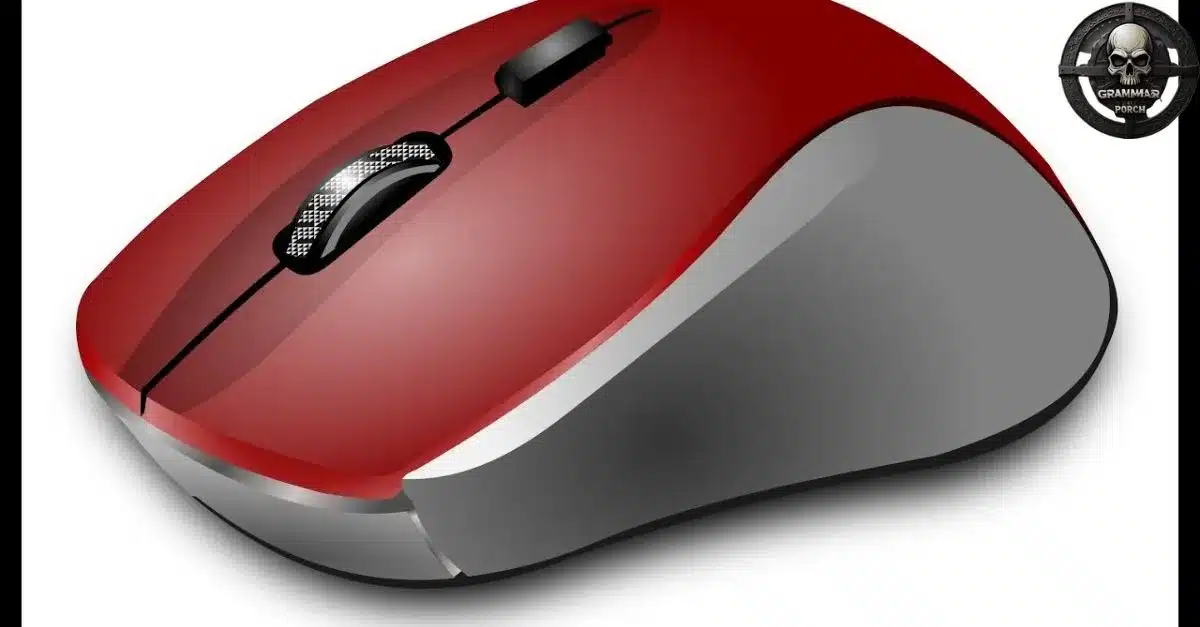The plural of mouse can be confusing due to its irregular plural form. For the animal, the correct plural is “mice,” an example of how English language rules don’t always follow standard patterns. When referring to the computer device, some people use “mouses,” although “mice” is still commonly accepted.
The confusion stems from the dual meaning of the word mouse. Knowing when to use each plural form is key to avoiding mistakes. Generally, “mice” is correct in most contexts, while “mouses” might be used for multiple computer devices, especially in informal or technical discussions. Understanding these grammar rules can help improve your writing clarity.
Definition of Mouse or Mice?

Mouse: A small handheld input device used to control a computer’s cursor and interact with its interface.
Mice: The plural form of “mouse,” typically referring to multiple computer input devices or small rodents.
What Is the Plural of Mouse? Is it Mouses or Mice?
The plural of mouse in most cases is “mice.” This applies when we’re referring to the small rodents we commonly know. Mice is an irregular plural noun because it doesn’t follow the typical rules of adding “-s” or “-es” to form the plural.
However, when it comes to technology, particularly computer devices, “mouses” is also accepted as the plural form, though it’s less common. Knowing the correct context is key to understanding which form to use.
For example, if you’re talking about more than one computer mouse, some people may say “mouses.” However, others prefer to stick with “mice” even in this case, as the term has become widely accepted. The reason behind this duality lies in the evolution of the English language and how new words, like those related to technology, sometimes develop their own rules.
Mouses or Mice?

Why do we say mice for the animal but occasionally say mouses for the device. The reason is mostly due to language evolution. When the computer mouse was first introduced, people naturally tried to use the same plural rules they knew for the animal.
Over time, some people began using “mouses” to differentiate between the animal and the device. However, “mice” remains the more widely accepted plural for both. To help you decide, it’s a good idea to consider your audience.
In more formal writing, sticking with “mice” might be the better choice, even when referring to the computer mouse. On the other hand, in more casual or tech-specific settings, “mouses” could be appropriate, though it’s always safe to use “mice.”
Why Is There Confusion over the Plural of Mouse?
The confusion around the plural of mouse stems from the fact that “mouse” is one of the many irregular plural nouns in the English language. While most nouns simply add “-s” or “-es” to become plural, certain words like “mouse” change entirely, becoming “mice.”
This kind of irregularity often throws people off, especially when the same word is applied to different things, such as both animals and technology.
Another reason for the confusion is the informal use of the word. Over time, language tends to adapt to its speakers. In many cases, people started using mouses for the computer device, which diverges from the animal-related plural form.
What Does the Word “Mouse” Mean?

The word “mouse” refers to two different things. First, it’s a small rodent, often found in homes, fields, and forests. These animals are characterized by their small size, long tails, and sharp teeth.
In addition to being a common rodent, “mouse” also refers to the computer device used to move a cursor on a screen. Both meanings come from similar roots, with the computer mouse being named after its resemblance to the animal.
What’s the Difference Between “Rat” and “Mouse”?

People often confuse rats and mice, but there are significant differences between the two. A mouse is much smaller than a rat and has a thinner, more delicate tail.
Rats, on the other hand, are larger with thicker tails and tend to be more aggressive. Animal characteristics of mice also include a more timid nature, faster movements, and smaller physical features overall.
In terms of pluralization, however, both words follow different rules. While the plural of “mouse” is “mice,” the plural of “rat” is simply “rats.” This is because “rat” follows the standard rule of adding “-s” to form the plural, unlike the irregular form of “mouse.”
Plural of “Mouse”
As mentioned earlier, the plural form of mouse depends on context. For the animal, it’s “mice.” For the computer device, both “mice” and “mouses” are considered correct, though “mice” is more commonly accepted.
This dual use is a perfect example of how language evolves and adapts to new inventions and technologies. In most cases, you’ll find that “mice” works in almost every situation, but it’s always good to understand the history behind the less common “mouses.”
Pronunciation of Word “Mouse”

When it comes to pronunciation, “mouse” is pronounced as /maʊs/ for both singular and plural forms. However, mice changes to /maɪs/, with a long “i” sound.
The pronunciation for “mouses,” when used in reference to computer mice, is the same as the singular form. Though the word changes its spelling when pluralized, the pronunciation remains straightforward.
Why “Mices” is Incorrect
It’s important to note that “mices” is never correct. Some people might assume that adding “-s” is a valid way to pluralize “mouse,” but this is not the case. The reason lies in the rules of irregular plural nouns.
These words, like “child” (which becomes “children”) or “goose” (which becomes “geese”), follow their own unique rules that do not align with the standard “-s” or “-es” addition. “Mices” is a misunderstanding of these grammatical structures and should never be used.
Which One Should Be Used: “Mouses” or “Mice”?

When writing or speaking, the form you choose depends on the context. For instance, if you’re talking about the animal, you should always use “mice.” In most cases, even when referring to multiple computer devices, it’s safe to use “mice.”
However, in certain tech-related conversations, you might hear or see “mouses,” and it’s generally accepted in those scenarios.
Ultimately, the use of “mouses” vs “mice” comes down to audience and setting. If you’re writing for a formal audience or one unfamiliar with tech jargon, “mice” is the better choice.
What Are Irregular Plurals?
Irregular plural nouns are words that don’t follow the usual rules for pluralization in the English language. Instead of simply adding “-s” or “-es” to form the plural, these nouns undergo changes in their spelling or structure. Words like “child” become “children,” and “foot” becomes “feet.”
The plural of mouse follows this same pattern, changing to mice rather than “mouses.” These irregularities are what make English grammar more challenging at times.
Irregular plurals often come from older forms of English, dating back to when the language followed different rules for nouns and verbs. This explains why some plural forms, like “mice,” seem outdated but are still used today.
Using “Mouse,” “Mice,” and “Mouses” in Sentences
Mouse:
- The small mouse scurried across the floor.
- She found a mouse in the kitchen cupboard.
- The mouse built a nest under the porch.
- He clicked the mouse to open the folder.
- A white mouse is often used in laboratory experiments.
- The computer mouse stopped working after it fell.
- I saw a mouse hiding behind the bookshelf.
- The new mouse model is designed for gamers.
- My pet mouse loves to nibble on cheese.
- We need a new mouse for the office computer.
Mice:
- We saw several mice running in the attic.
- The trap caught two mice last night.
- Mice are known to be quick and sneaky.
- He bought new mice for all the office computers.
- Field mice often invade homes during the winter.
- The lab is studying the behavior of mice under stress.
- Mice chewed through the electrical wires.
- She has a collection of vintage computer mice.
- The farm was overrun with mice last season.
- They discovered mice living in the walls of the old house.
Mouses:
- The tech store sells wireless mouses in various colors.
- We ordered new mouses for the IT department.
- These ergonomic mouses are better for wrist support.
- I prefer optical mouses for gaming.
- The shipment of mouses arrived earlier than expected.
- Mouses designed for left-handed users are rare.
- Most modern mouses have Bluetooth connectivity. 8
. They tested several mouses to find the most responsive one.
- Some old-school mouses still use a ball instead of a sensor.
- The office needs more mouses for the new computers.
Synonyms of Word “Mouse”
For the animal:
- Rodent
- Vermin
- Small mammal
- Critter
- Field mouse
For the computer device:
- Pointing device
- Input device
- Peripheral
- Trackball (alternative type)
- Cursor controller
Origins of the Word “Mouse”
The word “mouse” comes from the Old English word “mūs,” which itself has roots in the Proto-Indo-European language, where it meant “to steal” or “to hide.” This fits the animal mouse’s characteristics of sneaking and hiding.
When computer mice were developed, the name was given because the device resembled the animal in both size and shape. The origins of the word mouse reflect how language evolves to suit new inventions.
FAQs
What is the plural of “mouse”?
The plural of “mouse” is “mice.” This is an example of an irregular plural noun in English.
Can I use “mouses” as the plural form?
While some people use “mouses” informally, it is not considered correct in standard English. The accepted plural form is “mice.”
Why is “mouse” an irregular plural?
Mouse is irregular because it does not follow the typical pattern of adding -s or -es to form the plural. Instead, it changes the vowel sound.
In what contexts do we use “mice”?
Mice is used to refer to multiple animal mice or can also refer to multiple computer mice (input devices) in a technical context.
Are there other examples of irregular plurals like “mouse”?
Yes, other examples of irregular plurals include “man” (men), “woman” (women), and “child” (children).
Conclusion
Understanding the plural of mouse comes down to recognizing context. For the animal, the correct plural is “mice,” following the irregular plural rule in the English language. However, when referring to computer devices, both “mice” and “mouses” are used, though “mice” is more common.
This distinction is due to the evolving nature of language. Knowing when to use each form will help you avoid confusion and ensure accuracy, especially in formal writing. The key is understanding these grammar rules and applying them appropriately.

Larry is an experienced blogger with a passion for simplifying grammar. With years of expertise in writing and language, he shares insightful tips on punctuation, synonyms, and the intricacies of English grammar at **Grammar Porch**. His approachable style helps readers improve their writing skills with ease.

